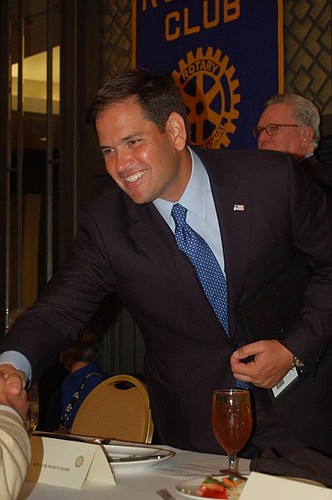
Real-estate magnate Donald Trump won a crushing victory in the Florida Republican presidential primary Tuesday night, turning what was originally expected to be a race between two of the state’s favorite sons into the death knell for the last Florida candidate standing.
As unofficial results showed U.S. Sen. Marco Rubio handily losing his home state, the onetime tea party hero who became the establishment’s best hope in 2016 told supporters in Miami that he was suspending his presidential campaign. His exit came less than a month after former Florida Gov. Jeb Bush dropped his presidential bid.
With more than 97 percent of precincts reporting, Trump had almost 46 percent of the vote to Rubio’s 27 percent — a difference of more than 430,000 votes out 2.3 million cast.
U.S. Sen. Ted Cruz of Texas came in third with 17 percent of vote, and Ohio Gov. John Kasich was a distant fourth with less than 7 percent.
The win gives Trump all 99 of Florida’s elected delegates to the Republican National Convention this summer.
On the Democratic side, former Secretary of State Hillary Clinton routed U.S. Sen. Bernie Sanders of Vermont. Clinton had more than 64 percent of the vote, to 33 percent for Sanders.
Rubio left the race continuing to question whether Trump, who has a showman’s flair and a knack for causing uproars with heated and sometimes outlandish comments, is the best representative for the Republican Party in November.
“America needs a vibrant conservative movement, but one that’s built on principles and on ideas, not on fear, not on anger, not on preying on people’s frustrations,” Rubio said. “But after tonight it is clear that while we are on the right side, this year, we will not be on the winning side.”
In victory remarks at Mar-a-Lago, a Palm Beach estate owned by his business organization, Trump applauded Rubio.
“He’s tough, he’s smart, and he’s got a great future,” Trump said.
Republican Party of Florida Chairman Blaise Ingoglia, who doubles as a state representative, praised Rubio in a statement issued by the party.
“He contributed mindful, substance based arguments and articulated conservative ideals since the start of his presidential bid,” Ingoglia said. “His optimistic message and commitment to American exceptionalism has helped keep conservative values in focus for 2016.”
In a statement issued less than an hour earlier, Ingoglia devoted one sentence to congratulating Trump before pivoting to a Republican vow to beat Clinton in the general election.
Florida Democrats didn’t even bother to conceal their glee at the end of Rubio’s presidential bid.
“Florida Democrats knew that once Americans got to know Marco, they would see what those of us in the Sunshine State have known all along: Rubio is nothing more than a self-centered career-politician heavy on ambition and light on substance,” party Chairwoman Allison Tant said in a statement issued after the result became clear.
It was a stunning downfall for a young, charming figure who rose from relative obscurity to become speaker of the Florida House and then U.S. senator before he was 40 years old.
In 2010, Rubio stared down essentially the entire GOP establishment to drive then-Gov. Charlie Crist out of the party; he beat Crist and then-Democratic Congressman Kendrick Meek in a three-man Senate race that November.
Rubio also crafted several different and at times seemingly contradictory images for himself. In his U.S. Senate campaign, he cast himself as a leader of the tea party movement angry at both the Democratic and Republican establishments.
After the Republicans lost a second straight presidential election in 2012, he took on comprehensive immigration reform — a priority of the GOP establishment, and one Rubio was forced to abandon during his presidential run.
Over the last several months, he still continued to be seeking a durable template for his campaign. Rubio started as the optimistic, young face of the party; then, as February wore on, he became sharply and often personally critical of Trump.
At one point, Rubio implied that a sensitive part of Trump’s anatomy was small — a comment Rubio later said he regretted.
Meanwhile, Trump surged to the front of the Republican pack while savaging Bush, who started the race as a favorite, but never figured out how to deal with Trump and dropped out of the race after disappointing showings in Iowa, New Hampshire and South Carolina.
In a move apparently aimed at boosting either Bush or Rubio, the Republican Party of Florida decided to make its primary winner-take-all, giving whoever carried the state a sizable chunk of the 1,237 delegates needed to win the GOP presidential nomination.
Some saw the vote as the decisive battle between the fresh-faced Rubio and Bush, his political mentor.
Instead, with Bush out and Rubio faltering, Florida shaped up a battle for survival for the state’s junior senator. It was a battle he lost Tuesday.